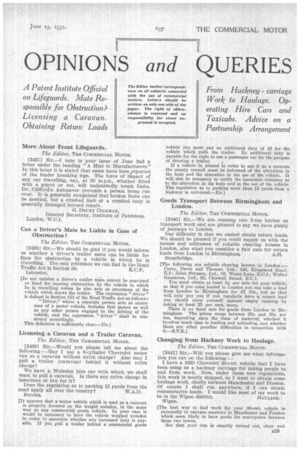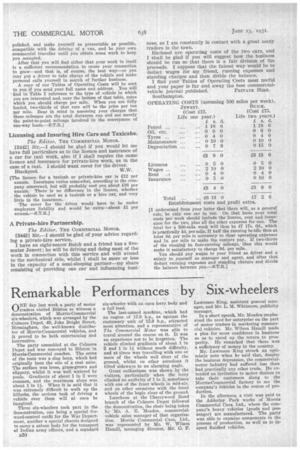OPINIONS and QUERIES More About Front Lifeguards.
Page 43

Page 44

If you've noticed an error in this article please click here to report it so we can fix it.
The Editor, THE COMMERCIAL MOTOR.
[3437] Sir,—I note in your issue of June 2nd a letter under the heading "A Hint to Manufacturers." In this letter it is stated that cases have been .reported of the fender breaking legs. The force of impact of any car travelling, says at 20 m.p.h., whether fitted with a guard or not, will undoubtedly break limbs. Dr. Clifford's Autosaver prevents a person being run over. It is generally recognized that broken limbs can be mended, but a crushed limb or a crushed body is generally damaged beyond repair.
G. DRURY COLEMAN,
General Secretary, Institute of Patentees. London, W.C.1.
Can a Driver's -Mate be Liable in Case of Obstruction ?
The Editor, THE COMMERCIAL MOTOR.
[3438] Sir,—We should be glad if you would inform us whether a driver's trailer mate can be liable for fines for obstruction by a vehicle in which he is travelling. The only reference we can find in the Road Traffic Act is Section 50., Leicester.
[In our opinion a driver's trailer mite cannot be convicted or fined for causing obstruction by the vehicle in which he is travelling unless he also acts as steersman of the vehicle which draws the trailer. The expression " driver " is defined in Section 121 of the Road Traffic Act as follows : "Driver," where a separate person acts as steers
man of a motor vehicle, includes that person as well as any other person engaged in the driving of the
vehicle, and the expression " driver " shall be con
strued accordingly.
This definition is sufficiently clear.—En.]
Licensing a Caravan and a Trailer Caravan.
The Editor, THE COMMERCIAL MOTOR.
[34391 Sir,—Would you please tell me about the following :—May I use a 6-cylinder Uhevrolet motor van as a caravan witliout extra charge? Also may I pull a trailer (caravan) behind it without extra charge?
We have a Wolseley hire ear with which we shall want to pull a caravan. Is there any extra charge in insurance or tax for it?
Does the regulation as to parking 15 yards from the road apply all over the country? W.A.D. Beceles.
[It appears that a motor vehicle which is used as a caravan is properly licensed on the weight unladen, in the same way as any commercial goods vehicle. In your case it would be necessary to have the vehicle weighed unladen in order to ascertain whether any increased duty is payable. If you pull a trailer behind a commercial goods
vehicle you must pay an additional duty of £6 for the vehicle which pulls the trailer. No additional duty is payable for the right to use a passenger car for the purpose of drawing a trailer.
If a vehicle be altered in order to use it as a caravan the county council must be informed of the alteration in the body and the alteration in the use of the vehicle. It will also be necessary to notify the insurance company as to the alteration in the body and in the use of the vehicle. The regulation as to parking more than 15 yards from a highway is universal.—En.] Goods Transport Between Birmingham and London.
The Editor, THE COMMERCIAL MOTOR.
[3440] Sir,—We are .running two 5-ton lorries on transport work and are pleased to say we have plenty of journeys to London.
Our difficulty is that we cannot obtain return loads. We should be pleased if you could supply us with the names and addresses of reliable clearing houses in London, also what you consider a fair rate for return
loads from London to Birmingham.' A.H. Sto-urbridge.
[The following are reliable clearing houses in London:— Carey Davis and Thomas, Ltd., 145, Kingsland Road, E.2 ; Allan Simpson, Ltd., 16, Water.Larie, E.C.3 ; Walter Gammons, Ltd., 85, Chiswell Street, E.0.1.
You must obtain at least is. per mile for your vehicle, so that if you come loaded to London you can take a load from London to Birmingham for £5 108., but as that will, only pay you if you regularly have a return load you. should cover yourself against empty running by asking at least 25 per cent. more.
There is no fixed rate for goods from London to Birmingham. The prices range between 25s. and 35s. per ton, depending upon the class of material, whether it involves much time in loading and unloading, and whether there are other peculiar difficulties in connection with it.—S.T.R.] Changing from Hackney Work to Haulage.
The Editor, THE COMMERCIAL MOTOR.
[3441] Sir,—Will you please give me what information you can on the following:—
I have a 1930 Chevrolet 30-cwt. vehicle that I have been using as a hackney carriage for taking people to and from work. Now, under these new regulations, this work is nearly stopped, so I want to obtain some . haulage work, chiefly between Manchester and Preston. Of course I shall run anywhere, if I can obtain remunerative loads. I would like most of my work to be in the Wigan district. HAULAGE. Wigan.
[The best way to find work for your 30-cwt. vehicle is personally to canvass concerns in Manchester and Preston which seem likely to have goods for conveyance between those two towns.
See that your van is smartly turned out, clean and
polished, and make yourself as presentable as possible, compatible with the driving of a van, and be your own commercial traveller until you obtain some work to keep you occupied.
After that you will find either that your work in itself is a sufficient recommendation to cause your connection to grow—and that is, of course, the best way—or you may put a driver to take charge of the vehicle and make personal calls yourself in search of further business.
A copy of our Tables of Operating Costs will be sent to you if you send your full name and address. You will find in Table I reference to the type of vehicle in which you are interested and, near the bottom of that table, rates which you should charge per mile. When you are fully loaded, two-thirds of that rate will be the price per ton per mile. Bear in mind in assessing your charges that these \mileages are the total distances run and not merely the point-to-point mileage involved in the conveyance of one-way loads.—S.T.R.]
Licensing and Insuring Hire Cars and Taxicabs.
The Editor, Tax COMMERCIAL MOTOR.
134421 Sir,—I should be glad if you would let me have full particulars as to the licence and insurance of a car for taxi work, also if I shall require the same licence and insurance for private-hire work, as in the case of a taxi." I should want cover for the driver.
Blackpool. W.W.
[The licence for a taxicab or private-hire car is £12 per annum. Insurance varies somewhat, according to the company concerned, but will probably cost you about £16 per annum. There is no difference in the licence, whether the vehicle be used as a taxicab or 11. hire car, and very little in the insurance.
The cover Tor the driver would have to be under employers liability and would be extra—about per annum.—S.T.R.]
A Private-hire Partnership.
The Editor, THE COMMERCIAL MOTOR.
(3443] Sir,—I should be glad of your advice regarding a private-hire service.
I have an eight-seater Buick and a friend has a fiveseater Jewett ; he will be driving and doing most of the work in connection with this service and will attend to the mechanical side, whilst I shall be more or less in the capacity of a semi-sleeping partner—my share consisting of providing one car and influencing busi-' ness, as I am constantly in contact with a great many traders in the town.
Enclosed are operating costs of the two cars, and I shall be glad if you will suggest how the business should be run so that there is a fair division of the proceeds. I suppose that the fairest way would be to deduct wages for my friend, running expenses and standing charges and then divide the balance.
I find your Tables of Operating Costs most useful and your paper is far and away the best commercial vehicle journal published. PRIVATE limn.
Southampton.
OPERATING COSTS (assuming 500 miles per week).
[I understand from your letter that there will, as a general rule, be only one car in use. On that basis your total costs per week should inclnde the licence, rent and insurance for the two, plus all the other, expenses for one. The total for a 500-mile week will thus be £7 17s. 6d., which is practically 4d. per mile. If half the running be idle then at least 8d. per mile is necessary to clear operating. expenses and is. per mile to make the venture pay. If two-thirds of the running be fare-earning mileage, then this would
• make it satisfactory to charge 9d. per mile.
You should pay wages to your friend as driver and a salary to yourself as manager and agent, and after that deduct running expenses and standing charges and divide the balance between you.—S.T.R.]




























































































